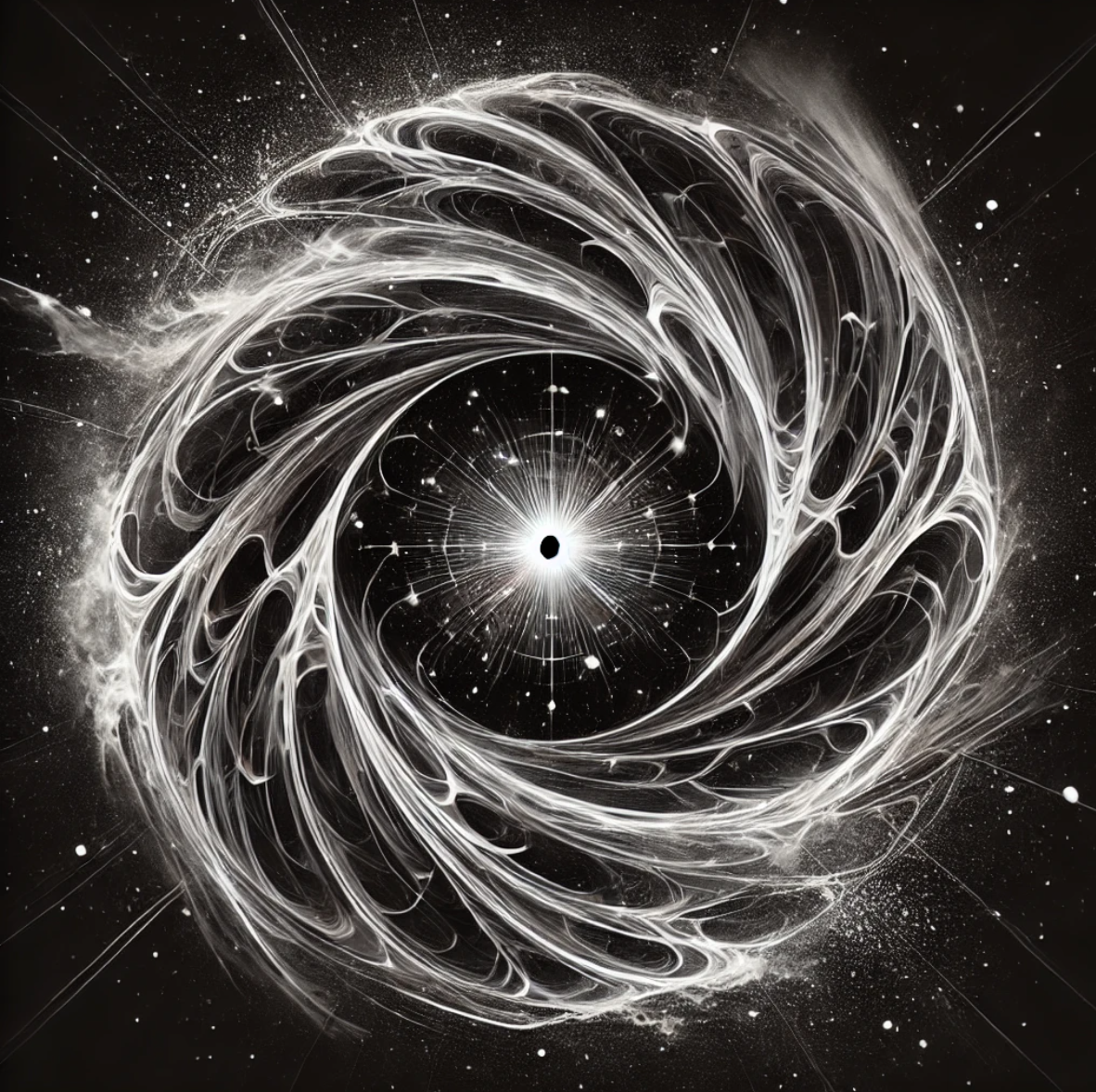How the Past Passed Without Entirety
-Kalishwar Das
The Traditional Scientific Paradigm
The concept of time and existence has been central to scientific inquiry for centuries, with each era bringing new insights and theories. However, the traditional scientific paradigm, which often views time as a linear and absolute entity, has limited our understanding of the past and its relationship with the present and future. Without the overarching concept of entirety, many scientists have grappled with the nature of time, often reaching conclusions that, while groundbreaking, remain incomplete.
Isaac Newton: The Deterministic Past
Newton’s Conception of Time: Isaac Newton’s work laid the foundation for classical mechanics, where time is treated as an absolute, unchanging flow that exists independently of the events it measures. In this framework, the past is seen as a fixed sequence of events that determine the present and future in a deterministic manner. Newton’s laws of motion, which describe how objects move through space and time, are based on this linear conception of time.
Limitations Without Entirety: Without the concept of entirety, Newton’s understanding of time is limited to a mechanical process, lacking the depth to account for the complexities of existence beyond physical interactions. The past, in Newtonian physics, is unalterable and directly influences the present, but it does not interact with or shape the future in any dynamic way beyond cause and effect.
Albert Einstein: Relativity and the Flexible Past
Einstein’s Revolution in Time: Albert Einstein’s theories of Special and General Relativity revolutionized our understanding of time, introducing the idea that time is relative and can be influenced by factors such as velocity and gravity. In Einstein’s framework, the past, present, and future are intertwined in a four-dimensional space-time continuum, where the separation between these states depends on the observer’s frame of reference.
Struggles Without Entirety: Despite his revolutionary ideas, Einstein’s rejection of quantum mechanics and his discomfort with the probabilistic nature of the universe reveal the limitations of his approach. Without the concept of entirety, Einstein’s view of the past remains constrained by the notion that time, while flexible, is still bound within the limits of physical laws. His struggle with the cosmological constant, which he introduced and later discarded, reflects his inability to fully reconcile the nature of the universe within a static or even a dynamic but closed framework.
Niels Bohr and Werner Heisenberg: The Quantum Past
Quantum Mechanics and the Nature of Time: Niels Bohr and Werner Heisenberg, key figures in the development of quantum mechanics, introduced concepts that further complicated our understanding of time. The uncertainty principle, introduced by Heisenberg, suggests that certain properties of particles, such as position and momentum, cannot be simultaneously known to arbitrary precision, leading to a probabilistic interpretation of time and events.
The Quantum Past Without Entirety: In quantum mechanics, the past is not a fixed series of events but a set of probabilities that only become certain when observed. This indeterminacy challenges the traditional view of time as linear and deterministic. However, without the concept of entirety, the quantum interpretation of the past lacks a broader context in which these probabilities and uncertainties can be fully understood. The interconnectedness of events, suggested by quantum entanglement, hints at a more complex reality, but it remains incomplete without the framework of entirety.
Stephen Hawking: The Beginning of Time and the Absence of Divinity
Hawking’s Contributions to Cosmology: Stephen Hawking’s work on black holes, the Big Bang, and the nature of the universe brought new insights into the origins and structure of time. In his book A Brief History of Time, Hawking discusses the concept of time beginning with the Big Bang and explores the possibility of a universe without a creator.
Challenges Without Entirety: Hawking’s rejection of God and his materialistic view of the universe limited his understanding of time to a purely physical process, beginning with the Big Bang and governed by the laws of physics. Without the concept of entirety, Hawking’s view of the past is constrained by the boundaries of the observable universe, missing the deeper, interconnected reality that could explain the existence and evolution of time itself. His dismissal of a divine presence leaves a gap in understanding the origins and purpose of time, a gap that the Theory of Entirety seeks to fill.
Carl Sagan: The Cosmic Perspective and the Eternity of Time
Sagan’s Vision of the Universe: Carl Sagan’s work emphasized the vastness of the cosmos and humanity’s small but significant place within it. His ideas about the cosmic perspective encouraged a broader view of time, one that stretches beyond the Earth and encompasses the entire universe.
Insights Without Entirety: While Sagan’s cosmic perspective expanded the human understanding of time and existence, it did not fully address the concept of eternity or the interconnectedness of all events across time and space. Without the concept of entirety, Sagan’s view of the past remains focused on the observable universe, lacking the infinite framework that could provide a more comprehensive understanding of time and existence.
Max Planck: The Quantum Revolution and the Fragmented Past
Planck’s Introduction of Quantum Theory: Max Planck, the father of quantum theory, introduced the idea that energy is quantized, which led to the development of quantum mechanics. This theory challenged the classical understanding of time and events, suggesting that reality at the smallest scales is discrete rather than continuous.
Quantum Challenges Without Entirety: Planck’s work revealed that the past, at a quantum level, is not a smooth continuum but a series of discrete events. However, without the concept of entirety, the fragmented nature of the quantum past is difficult to reconcile with the continuous experience of time in the macroscopic world. The Theory of Entirety offers a way to bridge this gap by suggesting that these quantum events are part of a larger, interconnected whole that governs the behavior of time and existence.
Reinterpreting the Past Through Entirety
The Past Within the Entirety Framework: The Theory of Entirety offers a transformative perspective on time and the past, suggesting that the past is not just a sequence of events but an integral part of an infinite and unchanging entirety. This framework allows for a dynamic interaction between the past, present, and future, where time is not linear but interconnected across the entirety.
Implications for Science and Spirituality: By reinterpreting the past through the concept of entirety, we can address the limitations and gaps left by traditional scientific approaches. The Theory of Entirety provides a holistic understanding of time and existence, where the past is not fixed but is part of a dynamic and evolving reality. This perspective opens up new possibilities for understanding the nature of reality, bridging the gap between science and spirituality.
A New Understanding of Time and the Past
The column “How the Past Passed Without Entirety” explores the limitations of traditional scientific views on time and existence when the concept of entirety is absent. By examining the contributions and struggles of key scientists, this section highlights the need for a new framework—one that the Theory of Entirety provides. This framework offers a more comprehensive understanding of time, where the past is not merely a record of what has happened but an active and interconnected aspect of an infinite reality.

